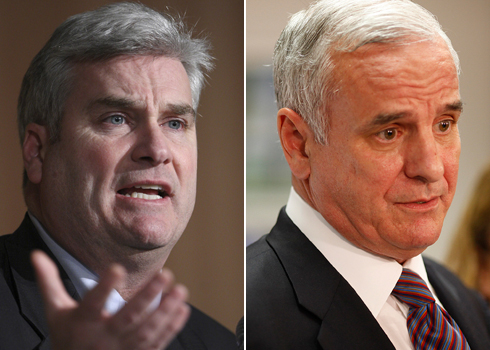In another fun development in the Minnesota gubernatorial recount, the campaign of Democratic nominee Mark Dayton has written a letter to the State Canvassing Board withdrawing all of its ballot-challenges that have been declared frivolous by local officials — and savaging the campaign of Republican nominee Tom Emmer for issuing a lot more of such challenges than they have.
Essentially, Team Dayton appears to be letting Team Emmer make themselves look bad, and could be trying to ingratiate their own side with the board ahead of a meeting on Friday, which was scheduled ahead of time just to examine this very issue.
“The 2010 Gubernatorial Recount to date has been disrupted by a striking pattern of frivolous challenges to ballots validly cast by lawful Minnesotan voters, with clear expression of voter intent and devoid of any identifying marks,” writes Dayton co-lead counsel Marc Elias (who previously served as Dem Sen. Al Franken’s lead attorney in the 2008 Senate recount). “I urge this Board to put an end to this unfortunate effort to disenfranchise Minnesota voters.”
According to the letter, Team Dayton had only lodged 42 frivolous challenges — that’s right, my fellow fans of absurdist comedy, 42 — compared to 2,544 from Team Emmer as of the close of business on Wednesday.
See here for a primer on the issue of how ballots that are challenged by a campaign end up being handled. The bottom line is that challenges that the local officials deem legitimate will result in the ballots being taken out of the count, pending adjudication by the State Canvassing Board. Challenged ballots declared to be frivolous by the local officials will still be counted, though they are also documented and set aside for possible review later on.
In the 2008 recount, the Coleman and Franken campaigns made thousands of challenges, most of them frivolous, in an ever-escalating battle over the expectations game that played with the apparent public numbers. This resulted in Coleman seemingly keeping his lead of about 200 votes headed into the Canvassing Board meeting, even though the underlying reality was that Al Franken was pulling ahead. (After the challenges were adjudicated, and before rejected absentee ballots were reconsidered, Franken led by just under 50 votes.)
The state legislature then passed new law forbidding frivolous challenges, and the new rules were adopted in order to implement the effort to deal with this very problem. As the board ultimately figured out, after much discussion, the reporting of the votes on frivolous ballots could potentially deter frivolous challenges. All in all, it has worked, but only on one end — Team Dayton has hardly made any of them, and has now withdrawn them, but Team Emmer’s number is one track to roughly equal Team Coleman’s from last time.
Elias writes in the letter of just one precinct:
As an example, I have attached a collection of 84 ballots from Minneapolis W13-P3 challenged by the Emmer campaign on Wednesday, December 1, 2010, which the table officials properly deemed to be frivolous challenges. As even a cursory review demonstrates, each ballot clearly expresses the voter’s intent and is devoid of any identifying marks. These ballots were all lawfully cast; indeed, they could be models for how a Minnesota voter ought to cast his or her vote. The challenges were frivolous and should never have been made.
Going into the recount, Dayton led by 8,770 votes, or 0.42%. While this is within the 0.5% needed to trigger a statewide recount, many observers have doubted that Emmer could pull ahead, as Dayton’s lead is probably too wide to be reversed barring any surprising discoveries in the hand count. However, a possible drawn-out legal contest could potentially result in Republican Gov. Tim Pawlenty staying in office in the interim, with the opportunity to work with a newly elected Republican legislature.






